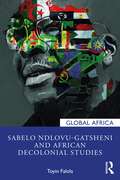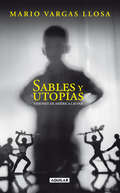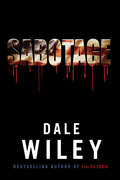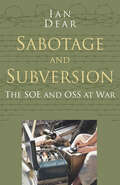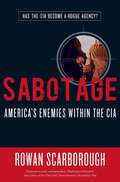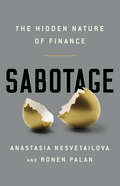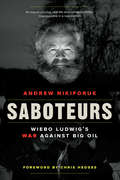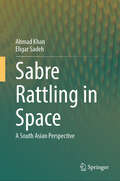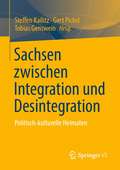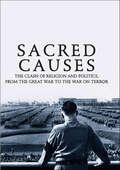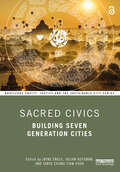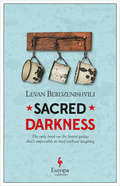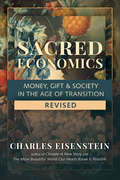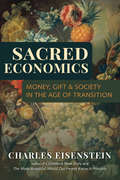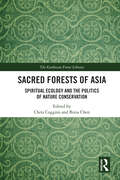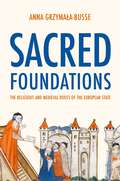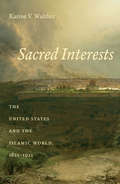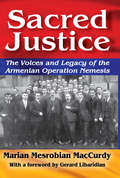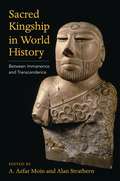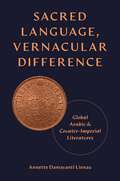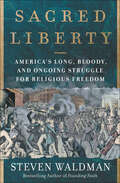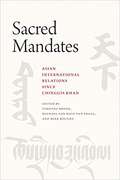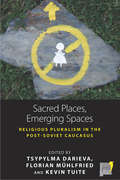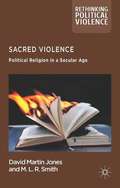- Table View
- List View
Sabelo Ndlovu-Gatsheni and African Decolonial Studies (Global Africa)
by Toyin FalolaThis book considers the work of the preeminent scholar on decoloniality, Sabelo Ndlovu-Gatsheni, as a means of examining the development of decoloniality discourse and considering the future direction of the African knowledge economy. Sabelo Ndlovu-Gatsheni has been instrumental in the construction of theories and ideas necessary for advancing a decolonial system of education and epistemology. This book considers how Professor Ndlovu-Gatsheni’s work has helped to shape our thinking both on Mugabe and the history of Zimbabwe, and beyond to the broader questions of race, liberation, higher education, and the future of decolonial studies. Renowned author Professor Toyin Falola then invites us to consider the dangers of continued repression of African epistemologies, and the enormous benefits of an alternative knowledge economy in which a diverse multiplicity of ideas drives our understanding of the world on to new heights. Unpacking the various conceptual leanings of decoloniality through the works of one of its leading lights, this book will be an essential read for researchers across the fields of African Studies, Race Studies, Philosophy, and Education.
Sables y utopías: Visiones de América Latina
by Mario Vargas Llosa¿Cuáles son los postulados liberales de Vargas Llosa? ¿Cuál es su posición ante la realidad latinoamericana? ¿Son los peligros y esperanzas que vislumbra para el continente? ¿Cómo han tomado forma sus ideas y compromisos? El recorrido intelectual de Mario Vargas Llosa. «La selección de ensayos que compone este volumen pretende aclarar estas cuestiones. En ellos, además de verse reflejado el recorrido intelectual del escritor, se analizan todos los grandes acontecimientos que han marcado la historia reciente de América Latina. No están ordenados cronológicamente sino por temas, ilustrando las batallas que Vargas Llosa ha dado por la libertad, desde su oposición frontal a las dictaduras, su ilusión y posterior desencanto con las revoluciones, sus críticas al nacionalismo, al populismo, al indigenismo y a la corrupción 'mayor amenaza para la credibilidad de las democracias', hasta el descubrimiento de las ideas liberales, su defensa irrestricta del sistema democrático y su pasión por la literatura y el arte latinoamericanos.»Carlos Granés
Sabotage
by Dale WileyEvery hour, explosions rock the United States.Without warning of where or when they will occur. Big cities, small towns, and rural back roads. Sinister messages appear on computer screens across America, and that message is clear.No one is safe…- Not disgraced FBI agent Grant, awaiting his call back to the big time;- Not rapper Pal Joey, an international sensation;- Not savvy beauty Caitlin, the ultimate “Sin City” party girl;- Not even Naseem, the would-be martyr who helped plan the attacks.An unhinged mastermind paralyzes a nation, and unlikely heroes must put aside their differences and forge an alliance to stop the attacks before the passing hours bring down a Nation.All roads lead to Las Vegas. Can four people, united only by their hatred of a common enemy stop … Sabotage?
Sabotage and Subversion: The SOE and OSS at War (Classic Histories Series)
by Ian DearDuring the Second World War daring and highly unusual missions were mounted by the Special Operations Executive (SOE) – formed on Churchill’s orders ‘to set Europe ablaze’ – and its American counterpart, the Office of Strategic Services (OSS). In sixteen separate chapters the author describes how the fearless individuals in these clandestine organisations were recruited, trained and armed, and examines some of their guerrilla operations in Europe, Africa and the Far East, such as the raid on Fernando Po, the destruction of the Gorgopotamos Bridge in Greece and the strike against Japanese shipping in Singapore harbour. Also covered are the means SOE and OSS used to subvert the enemy, by employing black propaganda, forgery, pornography and black market currency manipulation. It may well read like fiction but the stories are fact, and shows to what lengths the Allies were prepared to go to crush the Axis powers.
Sabotage: America's Enemies within the CIA
by Rowan ScarboroughHow Bush-hating CIA Bureaucrats Are Sabotaging the War on TerrorSince the attacks on September 11, 2001, intelligence collection has become the number-one weapon in the effort to defeat al Qaeda and Osama bin Laden. A plot penetrated is an attack stopped. And to the outside observer, the CIA has performed well as a key partner in the Bush administration's War on Terror. But as Rowan Scarborough reveals in this groundbreaking new book, significant elements within the CIA are undermining both the president and national security through leaks, false allegations, and outright sabotage.Using his first-rate sources in all levels of national security--from field officers to high-ranking analysts to former intelligence heads--Scarborough paints a disturbing picture of partisan politics endangering the success of our campaigns abroad and the very lives of our soldiers and agents.In Sabotage, you'll learn:* How CIA analysts repeatedly leak details about classified intelligence programs with the dual intent of ending them and damaging the president* How, on at least eight occasions, intelligence officials have made serious allegations of wrongdoing against the president's men--which turned out to be false* Why, contrary to popular belief, the CIA has become predominantly liberal* How a CIA turf battle prevented special operators from pursuing and capturing a notorious Taliban leader* How current and former CIA officers fueled conspiracy theories that President Bush orchestrated the 9/11 attacks on America* How a CIA leak to the New York Times deprived the U.S. of critical information in the War on Terror* How press leaks by the CIA have damaged relations with our foreign allies in the War on Terror* How a CIA analyst worked with Democrats to sabotage the nomination of John Bolton to the UN* How Clinton's downsizing of the CIA led to the closing of stations in scores of jihadist breeding grounds--including Hamburg, Germany, where the 9/11 plot was hatchedThe CIA's job is to collect facts and let the White House, the Pentagon, and the State Department make national security policy. But, as Scarborough conclusively demonstrates, an agency that is supposed to be scrupulously nonpartisan has become increasingly political--during a time of war--against America's elected commander in chief.
Sabotage: The Hidden Nature of Finance
by Ronen Palan Anastasia NesvetailovaI don't like the word 'sabotage',"--a former Goldman Sachs trader admitted. "It's just harsh.... Though, frankly, how else do you make money in this business...I mean, real money."The fundamental motive for financial innovation is not to make the system work better, but to avoid regulation and oversight. This is not a bug of the financial system, but a built-in feature. The president of the US is not a tax avoider because he is an especially fraudulent financier; he's a tax avoider because he is a wealthy man in a system premised on such deceit. Finance is an industry of sabotage. This book is a brilliant, intellectual detective story that traces the origins of financial sabotage, starting with the work of a prescient American economist who saw the capacity for banks and businesses to dissemble and profit as early as the 1920s. What was accomplished modestly in the first half of the 20th century became a booming global industry in the 1980s. Financialization took over everything, culminating in instruments so complex and confusing their own creators were being destroyed by them in 2008. With each financial bust, people expect to hear who the culprit was, and cynically know to not expect much punishment to ever reach them. But the innovation of this book is to show that each individual gaming the system isn't a crook---the whole system is sabotage.
Saboteurs
by Chris Hedges Andrew NikiforukAt Trickle Creek in northern Alberta, Wiebo Ludwig thought he'd buffered his tiny religious community from civilization, but in 1990 civilization came calling. A Calgary oil company proposed to drill directly in view of the farm's communal dining room. Ludwig wrote letters, petitioned, forced public hearings, and discovered the provincial regulator cared little about landowners. After the oil company accidentally vented raw sour gas, Ludwig's wife miscarried. Hostilities against the oil company began with nails on the roads, sabotaged well sites, and road blockades. They culminated in death threats, shootings, and bombings. The RCMP recruited a Ludwig acolyte as an informant, and in an attempt to establish the man's credibility the police themselves blew up an equipment shack. Ludwig was charged with 19 counts of mischief, vandalism, and possession of explosives, and he was later convicted on five charges. This taut work of nonfiction, first published in 2002, won both a Governor General's Award and the Arthur Ellis Award for True Crime Writing. With the escalation of oil and gas extraction over the past decade, the unsettling questions Saboteurs raises about individual rights, corporate power, police methods, and government accountability are more relevant than ever.
Sabre Rattling in Space: A South Asian Perspective
by Ahmad Khan Eligar SadehThis book offers historical and theoretical context of the path followed by States, from space militarization to weaponization, and deconstructs traditional security paradigm myths to prove that a paradigm shift has been brought because of deadly space weapons developed by major space powers. It reconciles that the strategic distrust between two leading space competitors, U.S. and China, has prompted them to pursue counter-space capabilities. The ripple effect of this troubling relation in space is not limited at the global level, but has witnessed a trickledown effect on regional security. In relation to this, the book offers details of the Indian space program including its military space ambitions, and provides information about Pakistan’s objectives in space. It offers an overview of challenges to international space governance and how the structural flaws help states to aggressively follow a path toward space weaponization. Additionally, it discusses the UN negotiating arms control measures in space and the politics of states not to negotiate prevention of an arms race in outer space. The book is a useful contribution to space security, from both traditional and contemporary approaches, covering history, theory, and application. It provides an academic as well as practical approach carrying appeal for professionals, experts, opinion makers, industry, academics, teachers, policy makers, politicians and masses from other walks of life who are interests in space security.
Sacamantecas y otros relatos vascos de terror
by Mikel Rodríguez ÁlvarezLas historias que constituyen este volumen son fruto de un afortunado cruce entre el género de terror ?muy particularmente tal y como lo entendió H. P. Lovecraft, cuya «presencia», siempre inquietante, es notoria a lo largo de todo el libro? y la tradición vasca más truculenta y esotérica. El título del texto que encabeza el volumen, Sacamantecas, o el de otros, como Sabbat, Hombre-lobo en Bergara o Vampiros en Donostia, son suficientemente elocuentes sobre el espíritu que ha animado al autor, Mikel Rodríguez, quien se ha servido de su condición de historiador para ambientar los relatos con notable rigor en el tiempo y en el espacio. Así, en ellos aparecen referencias explícitas al misterioso despoblado alavés de Otxate, a las cazas de brujas del siglo XVI y XVII en el Labourd y en el país del Bidasoa o al naufragio en extrañas circunstancias del mercante Komaroski en aguas de Donostia, suceso éste que pudo inspirar a Bram Stoker uno de los episodios más conocidos de Drácula. Del mismo modo, los relatos están poblados por personajes históricos, desde un asesino en serie como Juan Díaz de Garayo, el famoso Sacamantecas, hasta Sabino Arana, fundador del PNV, pasando por el científico Fausto Elhuyar o el fabulista Félix María Samaniego. Rodríguez se suma con este volumen a una corriente literaria, la del género fantástico y de terror, que, aunque quizá no aflore con excesiva frecuencia, fluye desde lo más profundo de la tradición y la historia vascas.
Sachsen zwischen Integration und Desintegration: Politisch-kulturelle Heimaten
by Gert Pickel Steffen Kailitz Tobias GensweinSachsen war in den vergangenen Jahren die Region Deutschlands, in der sich die Probleme der Erhaltung des gesellschaftlichen Zusammenhalts und der bis in die bürgerlichen Schichten hineinreichenden Desintegration in besonders heftiger Weise entfalteten. Gesellschaftliche Integration und Desintegration sind dabei zwei Seiten einer Medaille. Der Band widmet sich daher zwei eng verflochtenen Themenkomplexen, zum einen den Integrationsprozessen der sächsischen und deutschen Zuwanderungsgesellschaft, zum anderen Desintegrationsprozessen in der deutschen Gesellschaft, die teils mit Fremdenfeindlichkeit und Rechtsextremismus einhergehen.
Sacred Causes: The Clash of Religion and Politics, from the Great War to the War on Terror
by Michael BurleighBeginning with the chaotic post-World War I landscape, in which religious belief was one way of reordering a world knocked off its axis, Sacred Causes is a penetrating critique of how religion has often been camouflaged by politics. All the bloody regimes and movements of the twentieth century are masterfully captured here, from Stalin's Soviet Union, Hitler's Germany, Mussolini's Italy, and Franco's Spain through to the modern scourge of terrorism. Eloquently and persuasively combining an authoritative survey of history with a timely reminder of the dangers of radical secularism, Burleigh asks why no one foresaw the religious implications of massive Third World immigration, and he deftly investigates what are now driving calls for a civic religion to counter the terrorist threats that have so shocked the West.
Sacred Civics: Building Seven Generation Cities (Routledge Equity, Justice and the Sustainable City series)
by Jayne EngleSacred Civics argues that societal transformation requires that spirituality and sacred values are essential to reimagining patterns of how we live, organize and govern ourselves, determine and distribute wealth, inhabit and design cities, and construct relationships with others and with nature. The book brings together transdisciplinary and global academics, professionals, and activists from a range of backgrounds to question assumptions that are fused deep into the code of how societies operate, and to draw on extraordinary wisdom from ancient Indigenous traditions; to social and political movements like Black Lives Matter, the commons, and wellbeing economies; to technologies for participatory futures where people collaborate to reimagine and change culture. Looking at cities and human settlements as the sites of transformation, the book focuses on values, commons, and wisdom to demonstrate that how we choose to live together, to recognize interdependencies, to build, grow, create, and love—matters. Using multiple methodologies to integrate varied knowledge forms and practices, this truly ground-breaking volume includes contributions from renowned and rising voices. Sacred Civics is a must-read for anyone interested in intersectional discussions on social justice, inclusivity, participatory design, healthy communities, and future cities.
Sacred Darkness
by Levan BerdzenishviliBased on true events, this novel set in a Soviet prison is “both a feat of fractured storytelling and a beautiful excavation of a recent, haunting past” (Publishers Weekly).As a political dissident, Berdzenishvili lands in jail, serving a sentence on trumped-up charges of activism and agitation. But rather than being the hell he expected, jail allows him access to a wide array of intellectuals, professionals, citizens of all walks of life, many of whom, he freely admits, he would not have had the chance to meet if he had not been in jail.Here he bears witness to those lives. Each chapter carries a single person’s name and focuses on a single story. Collectively, however, these portraits create a multifaceted and vast picture of life in the Soviet Union, including during its demise. A nation seeks to suppress its brightest citizens, to keep them locked away in the dark. But in that darkness, unbeknown to the jailor, bonds stronger than walls were forming.
Sacred Economics, Revised: Money, Gift & Society in the Age of Transition
by Charles EisensteinExpanded and updated, Charles Eisenstein's classic treatise on capitalism, currency, and the gift economy.This revised version traces the history of money, from ancient gift economies to modern capitalism, and includes new material on cryptocurrencies and emerging research that has come out since the book's original publication. CharlesEisenstein shows how capitalism contributes to alienation, competition, and scarcity; destroys community; and necessitates endless growth at the cost of social and environmental devastation. Today, these trends have reached their extreme--and their collapse presents a golden opportunity to transition to a more connected, ecological, and sustainable way of being.Eisenstein describes the deeper narratives beneath our economic system, and how we can reimagine it to align with a new story. Applying a broadly integrated synthesis of theory, policy, and practice, he explores avant-garde concepts of the New Economics, including negative-interest currencies, local economies, gift economics, cryptocurrencies, and the restoration of the commons. Tapping into a rich lineage of conventional and unconventional economic thought, Eisenstein presents a vision that is original yet commonsense, radical yet gentle, and increasingly relevant as the crises of our civilization deepen.
Sacred Economics: Money, Gift, and Society in the Age of Transition
by Charles EisensteinSacred Economics traces the history of money from ancient gift economies to modern capitalism, revealing how the money system has contributed to alienation, competition, and scarcity, destroyed community, and necessitated endless growth. Today, these trends have reached their extreme--but in the wake of their collapse, we may find great opportunity to transition to a more connected, ecological, and sustainable way of being. This book is about how the money system will have to change--and is already changing--to embody this transition. A broadly integrated synthesis of theory, policy, and practice, Sacred Economics explores avant-garde concepts of the New Economics, including negative-interest currencies, local currencies, resource-based economics, gift economies, and the restoration of the commons. Author Charles Eisenstein also considers the personal dimensions of this transition, speaking to those concerned with "right livelihood" and how to live according to their ideals in a world seemingly ruled by money. Tapping into a rich lineage of conventional and unconventional economic thought, Sacred Economics presents a vision that is original yet commonsense, radical yet gentle, and increasingly relevant as the crises of our civilization deepen.About the Imprint: EVOLVER EDITIONS promotes a new counterculture that recognizes humanity's visionary potential and takes tangible, pragmatic steps to realize it. EVOLVER EDITIONS explores the dynamics of personal, collective, and global change from a wide range of perspectives. EVOLVER EDITIONS is an imprint of North Atlantic Books and is produced in collaboration with Evolver, LLC.From the Trade Paperback edition.
Sacred Forests of Asia: Spiritual Ecology and the Politics of Nature Conservation (The Earthscan Forest Library)
by Chris Coggins Bixia ChenPresenting a thorough examination of the sacred forests of Asia, this volume engages with dynamic new scholarly dialogues on the nature of sacred space, place, landscape, and ecology in the context of the sharply contested ideas of the Anthropocene. Given the vast geographic range of sacred groves in Asia, this volume discusses the diversity of associated cosmologies, ecologies, traditional local resource management practices, and environmental governance systems developed during the pre-colonial, colonial, and post-colonial periods. Adopting theoretical perspectives from political ecology, the book views ecology and polity as constitutive elements interacting within local, regional, and global networks. Readers will find the very first systematic comparative analysis of sacred forests that include the karchall mabhuy of the Katu people of Central Vietnam, the leuweng kolot of the Baduy people of West Java, the fengshui forests of southern China, the groves to the goddess Sarna Mata worshiped by the Oraon people of Jharkhand India, the mauelsoop and bibosoop of Korea, and many more. Comprising in-depth, field-based case studies, each chapter shows how the forest’s sacrality must not be conceptually delinked from its roles in common property regimes, resource security, spiritual matters of ultimate concern, and cultural identity. This volume will be of great interest to students and scholars of indigenous studies, environmental anthropology, political ecology, geography, religion and heritage, nature conservation, environmental protection, and Asian studies.
Sacred Foundations: The Religious and Medieval Roots of the European State
by Anna M. Grzymała-BusseHow the medieval church drove state formation in EuropeSacred Foundations argues that the medieval church was a fundamental force in European state formation. Existing accounts focus on early modern warfare or contracts between the rulers and the ruled. In contrast, this major study shows that the Catholic Church both competed with medieval monarchs and provided critical templates for governing institutions, the rule of law, and parliaments.The Catholic Church was the most powerful, wealthiest, and best-organized political actor in the Middle Ages. Starting in the eleventh century, the papacy fought for the autonomy of the church, challenging European rulers and then claiming authority over people, territory, and monarchs alike. Anna Grzymała-Busse demonstrates how the church shaped distinct aspects of the European state. Conflicts with the papacy fragmented territorial authority in Europe for centuries to come, propagating urban autonomy and ideas of sovereignty. Thanks to its organizational advantages and human capital, the church also developed the institutional precedents adopted by rulers across Europe—from chanceries and taxation to courts and councils. Church innovations made possible both the rule of law and parliamentary representation.Bringing to light a wealth of historical evidence about papal conflict, excommunications, and ecclesiastical institutions, Sacred Foundations reveals how the challenge and example of powerful religious authorities gave rise to secular state institutions and galvanized state capacity.
Sacred Interests: The United States and the Islamic World, 1821-1921
by Karine WaltherThroughout the nineteenth and early twentieth centuries, as Americans increasingly came into contact with the Islamic world, U.S. diplomatic, cultural, political, and religious beliefs about Islam began to shape their responses to world events. In Sacred Interests, Karine V. Walther excavates the deep history of American Islamophobia, showing how negative perceptions of Islam and Muslims shaped U.S. foreign relations from the Early Republic to the end of World War I. Beginning with the Greek War of Independence in 1821, Walther illuminates reactions to and involvement in the breakup of the Ottoman Empire, the efforts to protect Jews from Muslim authorities in Morocco, American colonial policies in the Philippines, and American attempts to aid Christians during the Armenian Genocide. Walther examines the American role in the peace negotiations after World War I, support for the Balfour Declaration, and the establishment of the mandate system in the Middle East. The result is a vital exploration of the crucial role the United States played in the Islamic world during the long nineteenth century--an interaction that shaped a historical legacy that remains with us today.
Sacred Justice: The Voices and Legacy of the Armenian Operation Nemesis (Armenian Studies)
by Marian Mesrobian MacCurdySacred Justice is a cross-genre book that uses narrative, memoir, unpublished letters, and other primary and secondary sources to tell the story of a group of Armenian men who organized Operation Nemesis, a covert operation created to assassinate the Turkish architects of the Armenian Genocide. The leaders of Operation Nemesis took it upon themselves to seek justice for their murdered families, friends, and compatriots. Sacred Justice includes a large collection of previously unpublished letters, found in the upstairs study of the author's grandfather, Aaron Sachaklian, one of the leaders of Nemesis, that show the strategies, personalities, plans, and dedication of Soghomon Tehlirian, who killed Talaat Pasha, a genocide leader; Shahan Natalie, the agent on the ground in Europe; Armen Garo, the center of Operation Nemesis; Aaron Sachaklian, the logistics and finance officer; and others involved with Nemesis. Marian Mesrobian MacCurdy tells a story that has been either hidden by the necessity of silence or ignored in spite of victims' narratives—the story of those who attempted to seek justice for the victims of genocide and the effect this effort had on them and on their families. Ultimately, this volume reveals how the narratives of resistance and trauma can play out in the next generation and how this resistance can promote resilience.
Sacred Kingship in World History: Between Immanence and Transcendence
by Moin, A. Azfar; Strathern, AlanSacred kingship has been the core political form, in small-scale societies and in vast empires, for much of world history. This collaborative and interdisciplinary book recasts the relationship between religion and politics by exploring this institution in long-term and global comparative perspective.Editors A. Azfar Moin and Alan Strathern present a theoretical framework for understanding sacred kingship, which leading scholars reflect on and respond to in a series of essays. They distinguish between two separate but complementary religious tendencies, immanentism and transcendentalism, which mold kings into divinized or righteous rulers, respectively. Whereas immanence demands priestly and cosmic rites from kings to sustain the flourishing of life, transcendence turns the focus to salvation and subordinates rulers to higher ethical objectives. Secular modernity does not end the struggle between immanence and transcendence—flourishing and righteousness—but only displaces it from kings onto nations and individuals. After an essay by Marshall Sahlins that ranges from the Pacific to the Arctic, the book contains chapters on religion and kingship in settings as far-flung as ancient Egypt, classical Greece, medieval Islam, Mughal India, modern European drama, and ISIS. Sacred Kingship in World History sheds new light on how religion has constructed rulership, with implications spanning global history, religious studies, political theory, and anthropology.
Sacred Language, Vernacular Difference: Global Arabic and Counter-Imperial Literatures (Translation/Transnation #52)
by Annette Damayanti LienauHow Arabic influenced the evolution of vernacular literatures and anticolonial thought in Egypt, Indonesia, and SenegalSacred Language, Vernacular Difference offers a new understanding of Arabic&’s global position as the basis for comparing cultural and literary histories in countries separated by vast distances. By tracing controversies over the use of Arabic in three countries with distinct colonial legacies, Egypt, Indonesia, and Senegal, the book presents a new approach to the study of postcolonial literatures, anticolonial nationalisms, and the global circulation of pluralist ideas.Annette Damayanti Lienau presents the largely untold story of how Arabic, often understood in Africa and Asia as a language of Islamic ritual and precolonial commerce, assumed a transregional role as an anticolonial literary medium in the nineteenth and twentieth centuries. By examining how major writers and intellectuals across several generations grappled with the cultural asymmetries imposed by imperial Europe, Lienau shows that Arabic—as a cosmopolitan, interethnic, and interreligious language—complicated debates over questions of indigeneity, religious pluralism, counter-imperial nationalisms, and emerging nation-states.Unearthing parallels from West Africa to Southeast Asia, Sacred Language, Vernacular Difference argues that debates comparing the status of Arabic to other languages challenged not only Eurocentric but Arabocentric forms of ethnolinguistic and racial prejudice in both local and global terms.
Sacred Liberty: America's Long, Bloody, and Ongoing Struggle for Religious Freedom
by Steven Waldman“[A] compelling study of the most essential breakthrough of modernity: the right to believe, or not, as one wishes. A great book about a monumental issue.” —Jon Meacham, Pulitzer Prize–winning authorSacred Liberty offers a dramatic, sweeping survey of how America built a unique model of religious freedom, perhaps the nation’s “greatest invention.” Steven Waldman, the bestselling author of Founding Faith, shows how early ideas about religious liberty were tested and refined amidst the brutal persecution of Catholics, Baptists, Mormons, Quakers, African slaves, Native Americans, Muslims, Jews and Jehovah’s Witnesses. American leaders drove religious freedom forward—figures like James Madison, George Washington, the World War II presidents (Roosevelt, Truman, and Eisenhower) and even George W. Bush. But the biggest heroes were the regular Americans—people like Mary Dyer, Marie Barnett and W. D. Mohammed—who risked their lives or reputations by demanding to practice their faiths freely. Just as the documentary Eyes on the Prize captured the rich drama of the civil rights movement, Sacred Liberty brings to life the remarkable story of how America became one of the few nations in world history that has religious freedom, diversity and high levels of piety at the same time. Finally, Sacred Liberty provides a roadmap for how, in the face of modern threats to religious freedom, this great achievement can be preserved.“This is an important and fascinating book full of riveting stories, provocative insights, inspiring heroes, and some serious warnings. The American model of religious freedom should be the envy of the world. But if we don’t understand how we made this great ‘invention,’ we could easily squander the achievement.” —Reza Aslan, #1 New York Times–bestselling author of Zealot
Sacred Mandates: Asian International Relations since Chinggis Khan (Silk Roads)
by Timothy Brook Michael van Walt van Praag Miek BoltjesContemporary discussions of international relations in Asia tend to be tethered in the present, unmoored from the historical contexts that give them meaning. Sacred Mandates, edited by Timothy Brook, Michael van Walt van Praag, and Miek Boltjes, redresses this oversight by examining the complex history of inter-polity relations in Inner and East Asia from the thirteenth century to the twentieth, in order to help us understand and develop policies to address challenges in the region today. This book argues that understanding the diversity of past legal orders helps explain the forms of contemporary conflict, as well as the conflicting historical narratives that animate tensions. Rather than proceed sequentially by way of dynasties, the editors identify three “worlds”—Chingssid Mongol, Tibetan Buddhist, and Confucian Sinic—that represent different forms of civilization authority and legal order. This novel framework enables us to escape the modern tendency to view the international system solely as the interaction of independent states, and instead detect the effects of the complicated history at play between and within regions. Contributors from a wide range of disciplines cover a host of topics: the development of international law, sovereignty, state formation, ruler legitimacy, and imperial expansion, as well as the role of spiritual authority on state behavior, the impact of modernization, and the challenges for peace processes. The culmination of five years of collaborative research, Sacred Mandates will be the definitive historical guide to international and intrastate relations in Asia, of interest to policymakers and scholars alike, for years to come.
Sacred Places, Emerging Spaces: Religious Pluralism in the Post-Soviet Caucasus (Space and Place #17)
by Tsypylma Darieva Florian Mühlfried Kevin TuiteThough long-associated with violence, the Caucasus is a region rich with religious conviviality. Based on fresh ethnographies in Georgia, Armenia, Azerbaijan, and the Russian Federation, Sacred Places, Emerging Spaces discusses vanishing and emerging sacred places in the multi-ethnic and multi-religious post-Soviet Caucasus. In exploring the effects of de-secularization, growing institutional control over hybrid sacred sites, and attempts to review social boundaries between the religious and the secular, these essays give way to an emergent Caucasus viewed from the ground up: dynamic, continually remaking itself, within shifting and indefinite frontiers.
Sacred Violence
by David Martin Jones M.L.R. SmithSacred Violence and Religious Violence examines the place that ideology or political religion plays in legitimizing violence to bring about a purer world. In particular, the book examines Islamism and the western secular, liberal democratic responses to it.
